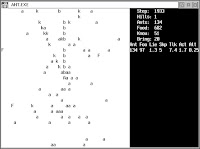 |
| Charles Darwin |
As all scientific theories, the theory of evolution will always be provisional, but in a century and a half it has been quite well contrasted. It's not likely that a scientific revolution will declare it wrong or obsolete, although perhaps there will be fine tuning, as with Newton's physics and Einstein's theory of general relativity. An attack on the theory of evolution should be based on finding discrepant facts, which up to now have never appeared.
The
problem is, some of those who defend the theory of evolution go one step
further and offer philosophical speculations and dogmatic statements as though they
were testable scientific theories.
As every scientific theory, the theory of evolution is a set of hypotheses that try to explain certain facts. It is based on the verification that species change, and studies the mechanisms that can lead to this change: mutations, DNA, natural selection... Added philosophical connotations are not scientific, whether it is affirmed, with believers, that there is intelligent design; or with atheists, that everything is a consequence of chance.
Supporters
of the theory
of intelligent design offer some evidence, such as the existence
of highly complex organs and processes (the eye, rotating flagella of bacteria,
chemical cycles of living beings...) or complicated behaviors, such as wasps
that paralyze spiders by injecting venom into nine nerve ganglions. Some of
these arguments are over a century old and were long ago refuted by
evolutionary biologists, going back to Darwin himself.
When
something is discovered in living things that it's impossible to explain with current
knowledge, an atheistic scientist will say that some as yet unknown cause will
explain, when discovered, the pending question. This is what I call Darwin's
hole. On the other hand, although everything known about living beings were
compatible with the action of apparent chance, the hypothesis of intelligent
design is not therefore excluded, for God may have included apparent chance
among the tools associated with the creation of the universe. We cannot deny God
the possibility of using mechanisms that we can use.
 |
| Artificial Life experiment |
A branch
of computer science (evolutionary programming) builds computer
programs inspired by biological evolution. When these techniques are used to
build systems of agents that mimic the behavior of living beings, we call them artificial life.
Simulating
ant colonies, for instance, sheds light on the behavior of swarms of beings
that act together and let us develop hypotheses about the emergence of
higher-level entities, such as multicellular organisms or human societies.
An experiment
on artificial life is a clear case of intelligent design by the programmer, but
the agents interact under the control of pseudo-random algorithms, i.e. apparent
chance. But the mathematician Gregory
Chaitin has proved that chance and pseudo-chance are mathematically
indistinguishable. If intelligent agents ever were to appear in
these simulations, they couldn't deduce the existence of the programmers by
experimentation, since we are outside their world, so they could reach the
false conclusion that their existence is a consequence of chance. In the same
way, we cannot prove the truth or the falsity of the hypothesis that the
universe has not been designed by anyone. Therefore, this hypothesis must be
considered non-scientific.
Neither intelligent design nor purely chance evolution are scientific theories, as it's impossible to prove them false. Both are metaphysical theories and must be presented thus. Natural science textbooks must not present intelligent design as an alternative to the scientific theory of evolution, but neither should they suggest that science has shown that God does not exist, or that the universe and living beings are the consequence of random evolution, because these claims are false. Science cannot prove any of those things.
No comments:
Post a Comment